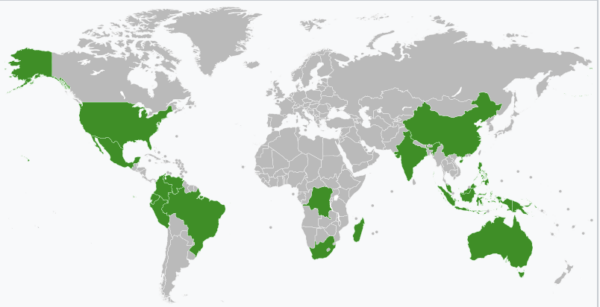Megadiverse Australia: For Now
A flurry of reports have appeared recently addressing our high level of diversity, how it is declining, and what we are doing about it. The short answer is that Australia is classified as megadiverse, this is declining rapidly, and we are doing very little about it.

The good news is that we classify as one of the 17 megadiverse countries across the world (see image from Wikipedia), that collectively support >147,000 documented species (7.8% of global total, Chapman 2009):
- >8,000 (12.5%) Chordates (fish, reptiles, birds, and mammals)
- >98,000 (7.3%) Invertebrates (no backbone, e.g. insects, arachnids, worms etc)
- >21,000 (7.1%) Plantae
- >11,000 (11.9%) Fungi and Lichens, and
- >4,000 (6.2%) Others.
The bad news is that the average size of 35,000 monitored wild animal populations around the world has declined by 73% in the last 50 years – not just the rare and endangered species, everything (WWF 2024). Added to this is the 80-95% decline in invertebrates that we have reported in earlier newsletters.
Regionally, the steepest animal declines were recorded in Latin America and the Caribbean (-95%), Africa (-76%) and Asia–Pacific (-60%).
The reasons are well-known and all point directly at humans: habitat loss, pollution, and climate change. We are all connected, and our way of life depends intricately on the myriad of benefits provided by ecosystem services that we are degrading. Long before our animals are reduced to showpiece populations in zoos, our food, the quality of our way of life, and that of our descendants will have undergone a massive decline.
You probably are tired of reading stories like this, as am I. But the problem is growing, and we generally are not doing our share of the effort to remove it.
Landcare folks can take a bow. Every tree you plant and every weed you destroy is a positive.
But are you doing enough? We cannot solve the global problem alone, its solution depends on the combined action of people just like you and me.
– Article by Greg Holland, based on indicated references.